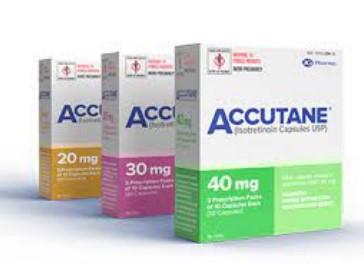Isotretinoin (Accutane): Uses, Side Effects, and Considerations
 Isotretinoin (Accutane) is a prescription medication used to treat severe acne. It is a powerful drug that can have serious side effects, so it is important to understand the potential risks and benefits before taking it. Isotretinoin works by reducing the amount of oil produced by the skin, which helps to reduce the number of acne lesions. It also helps to reduce inflammation and can help to prevent scarring. Isotretinoin is generally used as a last resort for severe acne that has not responded to other treatments. Common side effects include dry skin, lips, and eyes, as well as increased sensitivity to the sun. It is important to discuss any potential risks and benefits with your doctor before starting isotretinoin.
Isotretinoin (Accutane) is a prescription medication used to treat severe acne. It is a powerful drug that can have serious side effects, so it is important to understand the potential risks and benefits before taking it. Isotretinoin works by reducing the amount of oil produced by the skin, which helps to reduce the number of acne lesions. It also helps to reduce inflammation and can help to prevent scarring. Isotretinoin is generally used as a last resort for severe acne that has not responded to other treatments. Common side effects include dry skin, lips, and eyes, as well as increased sensitivity to the sun. It is important to discuss any potential risks and benefits with your doctor before starting isotretinoin.
Exploring the Benefits and Risks of Isotretinoin (Accutane) Treatment for Acne
Isotretinoin, commonly known by its brand name Accutane, is a powerful medication used to treat severe acne. It is a form of vitamin A that works by reducing the production of oil in the skin, which helps to prevent clogged pores and reduce inflammation. While isotretinoin can be an effective treatment for severe acne, it is important to understand the potential risks and benefits associated with its use.
The primary benefit of isotretinoin is its effectiveness in treating severe acne. It is often prescribed when other treatments, such as antibiotics and topical creams, have failed to provide relief. Isotretinoin can help to reduce the size and number of acne lesions, as well as reduce inflammation and redness. In some cases, it can even help to prevent scarring.
However, there are some potential risks associated with isotretinoin use. The most common side effects include dry skin, lips, and eyes; nosebleeds; and increased sensitivity to the sun. In rare cases, isotretinoin can cause serious mental health issues, such as depression and suicidal thoughts. It is important to discuss any mental health concerns with your doctor before starting isotretinoin treatment.
In addition, isotretinoin can cause birth defects if taken during pregnancy. Women of childbearing age must use two forms of birth control while taking isotretinoin and for one month after stopping the medication. It is also important to note that isotretinoin can cause liver damage, so regular blood tests are necessary to monitor liver function.
Overall, isotretinoin can be an effective treatment for severe acne, but it is important to understand the potential risks and benefits associated with its use. If you are considering isotretinoin treatment, it is important to discuss your concerns with your doctor. With the right precautions and monitoring, isotretinoin can be a safe and effective treatment for severe acne.
Understanding the Side Effects of Isotretinoin (Accutane) and How to Manage Them
Isotretinoin, commonly known by its brand name Accutane, is a powerful medication used to treat severe acne. While it can be an effective treatment, it can also cause a variety of side effects. It is important to understand these side effects and how to manage them.
The most common side effects of isotretinoin are dry skin, lips, and eyes. Patients may also experience nosebleeds, itching, and rashes. Other side effects include joint and muscle pain, headaches, and changes in vision. In rare cases, isotretinoin can cause depression, suicidal thoughts, and other mental health issues.
To manage the side effects of isotretinoin, it is important to take the medication as prescribed and to follow the doctor’s instructions. Patients should also use a gentle cleanser and moisturizer to keep their skin hydrated. It is also important to wear sunscreen and protective clothing when outdoors.
Patients should also be aware of the potential for mental health issues and should seek help if they experience any changes in mood or behavior. It is also important to talk to the doctor if any of the side effects become severe or do not go away.
Isotretinoin can be an effective treatment for severe acne, but it is important to understand the potential side effects and how to manage them. By following the doctor’s instructions and taking care of your skin, you can help reduce the risk of side effects and ensure that you get the most benefit from the medication.In conclusion, Isotretinoin (Accutane) is an effective treatment for severe acne, but it comes with a number of potential side effects and considerations. It is important to discuss the risks and benefits of this medication with your doctor before starting treatment. With proper monitoring and care, Isotretinoin can be a safe and effective way to treat severe acne.